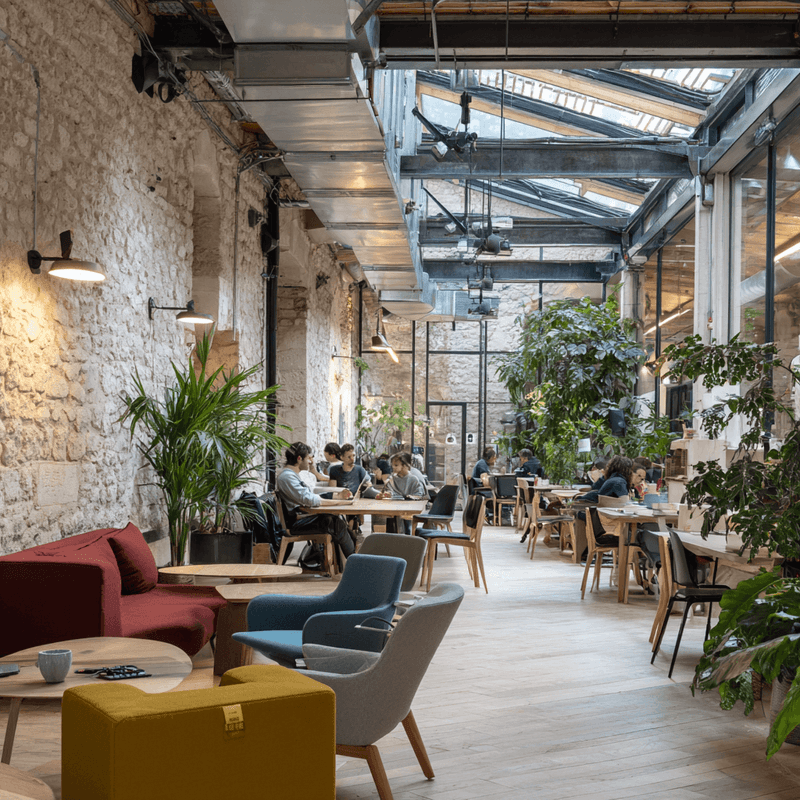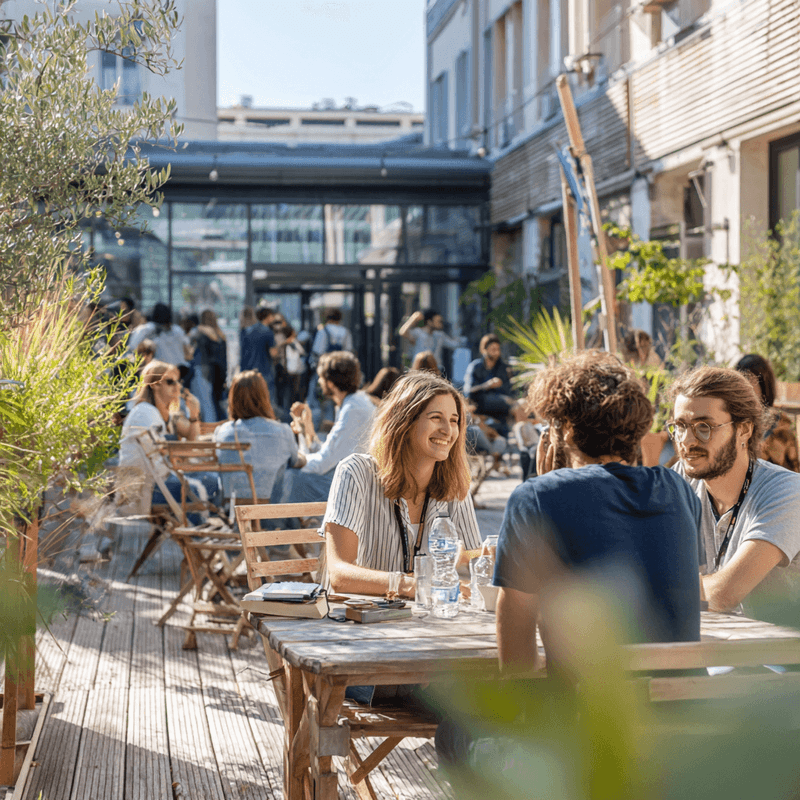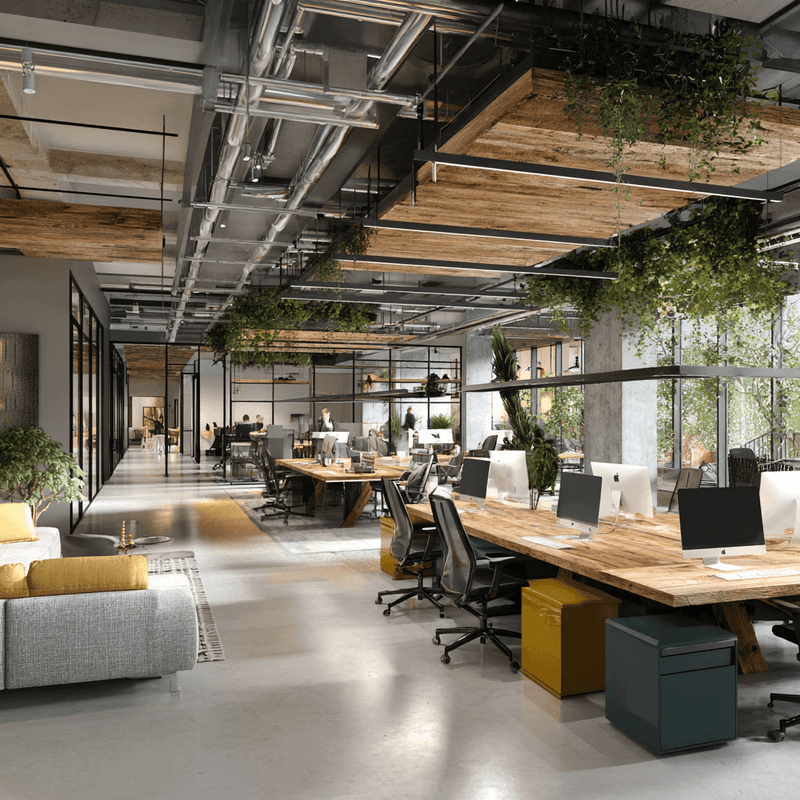
What do Pélussin in the Loire, Salaise-sur-Sanne in Isère, Murat in Cantal or Viverols in Puy-de-Dôme have in common? These towns all have a coworking space. Surprising? Not so sure... Because with the new possibilities offered by telecommuting, the trend of rural coworking is growing and the "coworkers of the fields" could well see their number increase in the years to come.
Rural coworking: an opportunity to fight against territorial fractures
Far from being a fad, shared work spaces have experienced a meteoric rise in recent years. Their number has tripled since 2017 and it is estimated that there are now more than 1,800 coworking spaces in France. After an exponential deployment in Paris and Ile-de-France, coworking has quickly spread to regional metropolises(Lyon, Bordeaux or Nantes remain among the best endowed) and then to medium-sized cities like Tours, Dijon, Bayonne, La Rochelle or Rouen.
These shared workspaces are now considered as tools for opening up territories and an opportunity for the local economy. In 2018, a report commissioned by Julien Denormandie, former Minister in charge of the City and Housing (La Mission Coworking: Territoires, Travail, Numérique) and entrusted to Patrick Levy-Waitz (President of the Travailler Autrement foundation) thus emphasized the fundamental role of these new places of exchange in the emergence of new structuring economic and social dynamics. Within the framework of this program initiated 2 years ago, the Ministry of Territorial Cohesion and Relations with Territorial Communities, represented by by Jacqueline Gourault, unveiled on October 23, 2020, the names of the new winners of the call for expressions of interest La Fabrique de territoires. Among the 300 projects selected, 150 are located outside the major urban centers, such as Saint-Denis-de-Gastines (Mayenne) where the restaurant in the town center will become a coworking space, as well as the former Hotel de la Gare in Hennebont (Morbihan).
More and more collaborative spaces are being created in rural areas
As Gerhard Krauss (author of the book Tiers-lieux and lecturer in sociology at the University of Rennes 2) points out in an interview for Capital magazine in December 2019, the phenomenon is growing: "today, half of the collaborative spaces that are created are located outside of major metropolises. These places often offer services other than just office sharing and are generally supported by the communities of communes. In Sérignac-sur-Garonne (47), the L'Espace Co-Clic-Co offers shared workspaces as well as help for individuals with paperless administrative procedures, for example. Another example is the Simone project in Châteauvillain in Haute-Marne (52), in the former Le Chameau boot factory. This atypical place, now labeled " Fabrique de Territoires ", hosts coworkers, artists in residence and also offers local services to residents (organic baskets, local producers' market, community café, etc.).
Moreover, Gerhard Krauss has also observed a lot of coworkers in the fields: among them, we find mainly former urbanites for whom life outside of large metropolitan centers is more in line with their priorities in terms of work/life balance and their ecological commitments.
The pandemic has opened the field of possibilities
The profile of these new coworkers is also reflected in the 8th edition of the Cadremploi study on the preferred cities of Parisian executives, published in August.The 8th edition of the Cadremploi study on the preferred cities of Parisian executives published in August 2020, which shows that 83% of the executives questioned said they were considering regional mobility.
Among the reasons for dissatisfaction, we find stress, cost of living and transportation time. But what changes compared to previous barometers is that the containment episodes linked to the Covid-19 pandemic have had the effect of dethe feasibility of working remotely, thus reducing the boundary between the fantasy of a green life and actually doing it. It now seems quite feasible to live outside a large metropolis without being completely isolated from the rest of the world. Because these neo-ruralists do not necessarily envisage a return to the land to raise sheep in the Larzac! They will make regular trips back and forth to the office to talk with their colleagues, attend video-conference meetings and spend a few days a week in a rural coworking space to create links or build a new professional network and thus reduce the psycho-social risks associated with the home office.
Offices to share in Spain, in the Perche region or on the hillsides of Lyon
Among the examples ofrural coworking spaces in Europe, we can mention Sende in Spain, which has been a pioneer in rural coworking/coliving. Since 2013, freelancers, artists or employees of large companies (Google, Facebook...) meet and exchange in this atypical place, in the heart of the Galician mountains in a small village of 20 inhabitants. Sende 2 should open in a few months in Setubal, 35 minutes from Lisbon.
In France, La Mutinerie (which had launched a first shared office space back in 2011 in Paris) opened a new location in 2014 called La Mutinerie Village in Saint-Victor-de-Buthon. In the middle of the Eurelian countryside and less than an hour and a half from the capital, this place also combines coworking and coliving. Residents enjoy more than 40 hectares of nature and can learn about permaculture or get information from the Perche Embassy, a program to help newcomers settle in the region.
In Charly, in the Rhône region, Club Melchior also offers a peri-urban workspace just 15 kilometers from Lyon. Since 2016, this 17th century building has been home to freelancers but also to an increasing number of mobile employees who benefit from numerous shared services and a particularly pleasant working environment, in the middle of the vineyards.
The latest example is in the Yvelines, in Méré, near Montfort-L'Amaury, with Le 50 Coworking, which welcomes its Ile-de-France coworkers in fully-equipped offices that can be used occasionally, regularly or full-time.
Finally, for digital nomads looking for a more radical option, workation (a contraction of work and vacation) offers a hybrid concept at the crossroads of coworking, coliving and hotel accommodation. If offers already existed before the pandemic in Bali, Thailand or Morocco, the Barrière group launched this summer "telework escapades in Brittany or Normandy, while the Hyatt chain is now offering a workation package with high-speed access, early check-in on Friday morning at 8am and discounted nights on Thursday and Sunday evenings.
-
Does coworking restore the value of work?

08/12/2025 Does coworking restore the value of work?
Today, many organizations see Coworking as more than just a real estate service; they see it as a space capable of restoring value to work itself and re-engaging teams. But what exactly is this "value" that coworking claims to restore?
-
Coworking: how do you build a community when you come from a large group?

21/09/2025 Coworking: how do you build a community when you come from a large group?
A coworking space offers much more than a shared office. It's a breeding ground for ideas, encounters and synergies, provided you know how to fit in. It's not just a question of working there, but of integrating and, better still, building a community.
-
Is the Flex Office the prerogative of all companies?

16/09/2025 Is the Flex Office the prerogative of all companies?
Reducing fixed spaces, doing away with allocated offices, rethinking the use of square meters: this flexible organization is winning over more and more companies. But can it really be applied to all structures, all sectors, all teams? The answer is clearly yes, provided that flex office is seen as a lever for change, not an end in itself.